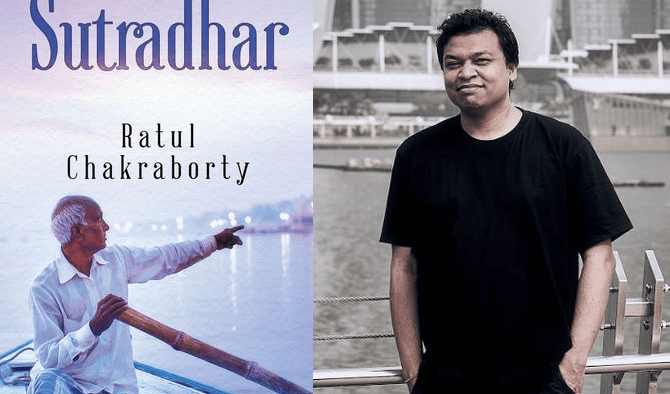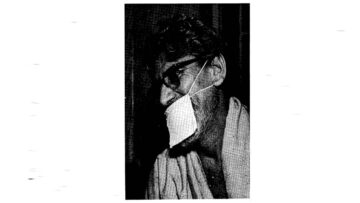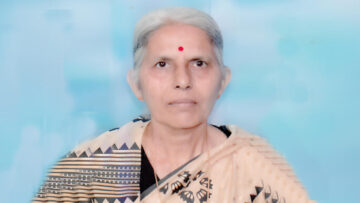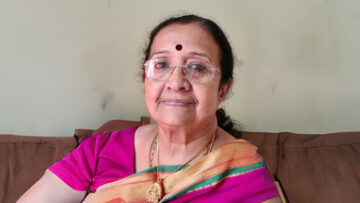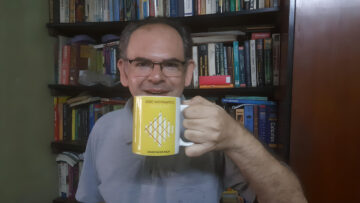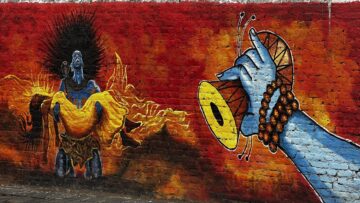Raghava Krishna interviews Ratul Chakraborty, the author of the upcoming new book ‘Sutradhar‘.
Raghav: Hi Ratul, this is fun to interview a friend and an ex-team mate who inspires and exasperates me in equal measure 🙂 – Congratulations on your debut book. Having seen the creative process that birthed this work from the sidelines, I know what this means to you. Can you begin by telling us a bit about your journey, the key influences and interests and the sparks the illuminated the path leading to this moment please.
Thank you Raghav for having me here. It still feels a bit surreal to me – how did all those ideas, conversations and random thoughts suddenly morph into a whole book?!! If I want to talk about inspiration, I would have to start with my family. Both sides of my family are originally from what is today Bangladesh. I still have faint memories of my grandmother telling me stories to put me to sleep – folk tales, mythological tales, historical tales. That must have been the original influence, which from my childhood onwards manifested itself in the form of a voracious appetite for stories – I still get goosebumps when I recall Abanindranath Thakur’s evocative portrayal of Bappa Rawal’s adventures in one of the chapters of Raj Kahini. I started to write from a young age itself, and still remember the joy when my first story got published in our school magazine – and that story incidentally holds the kernel to the final story of Sutradhar, The Path of a Coward! As I grew up, my cultural horizons also expanded – from Japanese Manga like Buddha and Lone Wolf and Cub, to Russian literature like Dead Souls and The Greatcoat, to the great Indian works of Bankim Chandra Chattopadhyay, Sharadindu Bandopadhyay and Kalki Krishnamurthy. Add to that my other interests – video games and photography, and I must admit that I have been fortunate to be able to draw from a plethora of very diverse sources of inspiration.
Raghav: You describe this book as ‘Indic Historical Fiction’ in this exciting format of short stories – What can you tell our readers about the kernel of the idea and the consideration set in choosing this format?
I began this journey not as an author, but as a storyteller. Each of the stories in the book started out flashes of inspiration that I had quickly jotted down. In true bardic tradition, I began to expand and embellish these at every retelling, and soon the scribbles began to resemble stories! When I thought of writing Sutradhar, I was clear from the very beginning that it was not going to be a straight retelling of historical incidents. My target was to create dramatic original content set in specific historical periods. So, I decided to use these existing notes as a base for the book. Coming from a video game background, I looked at each of these stories as a self-contained prototype, which can then be transferred individually or collectively to other media platforms and formats also. The final consideration was purely practical – I was not getting enough time at a stretch to write, and felt that I could tackle smaller stories more easily than attempting a full-length novel.
Raghav: The book is conceived as an arc that spans the civilizational breadth from the Saraswati civilisation times to the the time of partition – How should your readers approach this – Is there a sequence or an orientation for maximum reading pleasure even as each story is self-contained in itself?
Each story in this collection has three layers – the events in the story itself, the grand theme that underpins those events, and finally what I call the Bharatvarsha layer – the intangible quality which infuses the very being of our Rashtra that I hope to have succeeded in presenting to my readers. In the book the stories are arranged in a chronological order, and although the tales are self-contained in terms of narrative, my recommendation is to proceed in the order that they are presented.
Raghav: There seems to be an ideological intent behind this creative outpouring – Are there specific aspects of current cultural discourse that you seek to foreground into the collective consciousness through this work or is just a particularly fertile imagination having fun with ideas?
This book is a fight against deracination, above all my own. The vast majority of the mainstream entertainment that we consume today is infected with both overt and subconscious messaging that pushes a vicious socio-political narrative of a particular ideological slant. The tragedy is that most people are unaware of this cultural war that is being waged upon them. If I look back at the continuing evolution of my own thought process, I could readily identify the points where I was struck by cognitive dissonance of what I knew to be truth and what was being shown on the screen or written in books – one recent example would be the hugely popular Netflix series Sacred Games, where the entire narrative had a single minded focus of showing Hindu spiritual practices and political aspirations in the worst light possible. There are countless examples like these.
I began to write this book because I firmly believe that there is both need and demand for an entertaining and modern retelling of certain key episodes of Indian history done from an emic perspective. The objective was to create a cultural artefact in which I could challenge certain long held, ossified notions about our own history and culture that I felt did not stand the scrutiny of unbiased and irreverent logic. On the other hand, I also wanted to explore certain universal ideas from the Indic tradition in order to connect the present-day reader to events that happen in the narrative. Above all, I wanted the conflicts expressed here to be forward looking and contemporary, even though the setting might be in the past. The larger aim is to generate a certain level of emotional disquiet within the readers, that will hopefully propel them to look at the world with a fresh understanding and insight.
Raghav: Tell us a bit about the creative process itself – Unlike Game Development that you and I have been engaged in which is a collaborative, cross-functional enterprise translating abstract ideas into immersive, fun experiences, writing is a lonely pursuit – How do you reflect on this and what has the emotional graph for you been like in this journey?
From a personal point of view, the process of writing Sutradhar has been the most challenging yet fulfilling episode of my life. I have been writing Sutradhar in snatches for the best part of a decade, suffering through year-long writer’s blocks and periodic loss of inspiration. There were often times where I felt that it was a futile, never ending pursuit. But then I would read something or see something on social media that would cause an emotional upheaval, and I would write furiously for a week or so before reverting to my daily grind. I committed so many of the basic mistakes that writing coaches warn against – not making writing a habit, endlessly rewriting the same sentences, not having any idea where the plot was going most of the time… all of it guaranteed to make one lose his mind in frustration. However, the book had taken on a life of its own – it kept gnawing at the back of my mind until I decided to move on from my previous job, and prepared to commit myself 100% to finishing this. I vowed not to pick up a video game controller until I got to the end of the line, and after two months, I had the first draft of the manuscript in my hands! The joy at that moment was indescribable – I began to message friends and family with the widest smile I remember having since my marriage. That moment of joy sustained me through the multiple cycles of rewrites that I went through, which otherwise would have felt very painful indeed.
Raghav: Finally, tell us a bit about the process to get published and the support you got – We are often told editing is a cathartic process – There are a lot of exciting new voices out there who would love to learn from the experience of a first-hand account of this journey. How was it for you?
My biggest learning from this experience was that writing a manuscript and publishing a book are two completely different things. After the joy of completing a manuscript, came the endless wait for publishers to revert back, or the dread of opening yet another rejection letter citing unspecified causes. There is not much one can do, except remembering that “karmanyeVadhikaraste…” and keep looking for the next opening. At this point, I cannot thank Indic Academy and Shri Hari Kiran ji enough for their overall commitment to the Indic intellectual cause, and the support they have given to me that made the publication of Sutradhar possible.
Raghav: Any last words of advice for your readers?
I do not think I have any adhikara to give advice to my readers. All I can share are a couple of insights.
Firstly, the one thing that I have realized is that if I didn’t make this journey of writing Sutradhar, I would have regretted it for the rest of my life, perhaps without even knowing the cause of that regret. Probably my biggest achievement was managing to keep the hunger for writing the book alive amidst the more prosaic duties of day to day life.
Secondly, each one of us can make a difference in nurturing the Indic way of life in our own spheres. The first step to that is connecting to and learning from fellow seekers – Indic Academy is a great place to start this journey. Only by reclaiming and propagating our intellectual and cultural heritage at a grassroots level can we ensure a peaceful, joyful and sustainable future for our coming generations.
Finally, I do hope you enjoy reading Sutradhar, and I look forward to hearing what you think about it!
Disclaimer: The opinions expressed in this article belong to the author. Indic Today is neither responsible nor liable for the accuracy, completeness, suitability, or validity of any information in the article.

